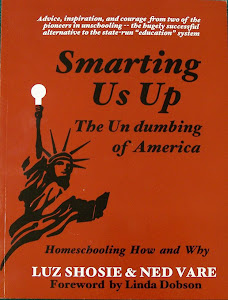“It is a rare child indeed who can come through his schooling with much left of his curiosity, his independence, or his sense of his own dignity, competence, and worth.”
– John Holt, The Underachieving School
Honk if you think any of the following are good ways to socialize: Sitting in boring classes with same-age, same-ability children for twelve years; pushing through crowded corridors to beat a buzzer; cheating; bullying; forming cliques; conforming to group pressures; doing busywork; long dangerous bus rides; hectic meals; being drugged for behavior; being diagnosed as "learning disabled" and put in Special rooms to be treated as patients instead of students.
More and more, these days, public schools are coming under criticism for the poor quality of their programs, their methods, and their employees. In response, the school folks do not try to defend their quality, but instead they often say, "But school is where children learn socialization." What do they mean by that?
The employees want the public to think of "socialization" as a version of "multi-culturalism" or racial tolerance. But when we look at what actually goes on in the schools, we notice frustration with petty rules, coercion, administrative secrecy, and retribution against anyone who dares to complain about the schools. We see massive failure on state and national tests, bloated "honor rolls" that include half to three-quarters of the students; grade inflation, social promotion; disrespect of parents. We see conformity, cheating, cliques and bullying, drugging of children, sales of junk food to students, poorly educated teachers, dishonesty and corruption. Are those the elements of "socialization" that we want our children to learn?
School employees try to convince us that children will be better adjusted to "society" as a result of attending their schools. Yet, how do they explain all the bullying and other violence there? How do they explain the suicide rate among children who attend, or the high dropout rate? After all, was socialization the reason for the government to establish the schools? If not, then why is that given as a big element of "education," especially when the original reason -- instruction in basic skills -- has been all but eliminated?
These days, when school employees promote "socialization," they avoid the subject of academic achievement. It is difficult for those employees to claim that children who attend their schools will become well educated there. Test scores reveal that American students are far below other industrial nations in basic skills and knowledge, and in CT, we find that academic standards for math and English are the worst in the country (see www.edexcellence.org)
To government, “socialization” means indoctrination to whatever beliefs, attitudes and opinions are deemed by officials as correct for the time being. Never in history has government wanted its citizens to become erudite people who will question its authority or power. Therefore, the purpose of public schools in America has always been to deliver a limited product of information and skills -- just enough to satisfy the Army and some businesses. It means turning out a uniform, docile workforce--obedient "human resources" who will be predictable voters and consumers.
In recent years, academic standards have been lowered to a point (in many states) of elimination, in favor of political correctness, group thinking and psychological conditioning. We hear the employees say, "We want the students to gain consensus on subjects." Thus, to the schools, socialization means group thinking. Unfortunately, the new low academic level results in more and more young people -- even high school graduates -- failing to pass the minimum testing to join the Army.
Has "socialization" replaced academic learning as the reason for supporting the public school system? To a great degree, it has. Transformational Education has infiltrated every public school, with its emphasis on changing children's freedom of attitudes and opinions to those approved by government. And what does the government want from its students? I believe that its employees and other boosters are using “socialization” as a new rationale for keeping so many children virtually imprisoned at public expense for so many years where they learn so little. End
Subscribe to:
Post Comments (Atom)


1 comment:
Right on! I never know what to say to the socialization question and here it is.
Post a Comment